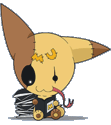Quote from nunya_bishieness
In my opinion the moon is symbolic of Toru's yearning for the other woman.
Thanks for the hint. I didn't think of the moon at all but I find your explanation to be very plausible, particularly the yearning part. Looking up to the moon has always been a symbol for longing, be it longing for a loved one or for freedom (e.g. from inside a prison cell).
Quote from bakerygirl
Quote from nunya_bishieness
Also there are panels that contrast the live fish in the sushi restaurant and the dead fish, which in my opinion implies that she too is being suffocated by that forced relationship. This can also be seen in her expressions, when she is outdoors, she can be seen smiling, and being cheerful, whereas at home her expressions look pained.
Interesting take on things. I was always of the opinion that she was the culprit rather than the victim. I took the contrast to mean that the sushi in the restaurant are free and have some shred of liberty. However the dead fish are a symbol for Yukari's love which is obsessive and constrains her. Words can take on so many meanings, don't you think?
I fully agree with you; she's limiting herself alongside Toru. Her psyche can't keep up with her fantasy of an intact relationship, and it shows: Not only does she have to work hard to keep the penguin alive and hidden, but she must constantly lie to herself, to her ex-boyfriend and to Toru's friends about their feelings. She may have overworked herself in order to distract her strained mind.
I noticed that she only realised the fish's putrid smell after she was confronted with the rival whose existence she had tried to forget. So it must have been the meeting's undeniable reality that broke her mental shell eventually (shown by the short haircut).
Quote from bakerygirl
Quote from Tripitaka
Since the heroine stays unnamed, one can probably go as far as taking her for a generalised example of this human behaviour.
I also noticed that she has been named. she is Kakegawa Yuri. But, the moral behind the story still makes sense without being considered as a general example.
You're right; I never realised this. Thanks for pointing it out.
Quote from bakerygirl
Quote from nunya_bishieness
I love how Okazaki Mari, took a children's tale and turned it on its head.
Even I loved this part about the story. I liked the fact that Yukari placed as well as removed the curse. Within the span of 48 pages she makes mistakes and atones for them, and we can actually feel the difference in her.
Thanks for making the link; it didn't occur to me at all that it could've been the Frog Prince's tale.
@bakerygirl Well-said. There's nothing left to be added.
Quote from bakerygirl
Quote from nunya_bishieness
I love how the two of you have analysed it. biggrin
That credit goes solely to Tripitaka. I only ask questions bigrazz
Come on, don't hide your light under a bushel. You contributed just as much to the analysis as I did. Besides, if you hadn't started this thread, we wouldn't be here today.
Anyway, thanks for the excitatory discussion, you two. I appreciate the opportunity to analyse this work with you. So if you ever get the urge to take a story apart, I'd be glad to join you.
Last edited by Tripitaka at 10:45 pm, Sep 17 2014________________
"Stories are what death thinks he puts an end to.
He can't understand that they end in him, but they don't end with him."
- Ursula K. Le Guin, GiftsTo be savoured:-
Blood Alone by TAKANO Masayuki
-
Otoyomegatari by MORI Kaoru
-
Gangsta. by Kohske
-
Seishun Kouryakuhon by AKIZUKI Sorata






